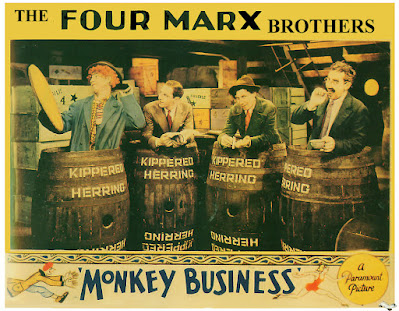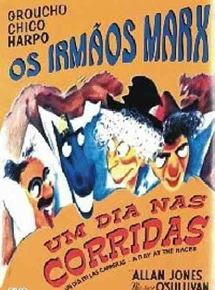There are few things more difficult for a translator than to translate a pun and make it work. Imagine then the difficulty of translating a movie that is full of puns and witty lines, such as the Marx Brothers movies. Most of what makes them fun loses the meaning in a language that is not English. For instance: the famous “sanity clause” joke from “A Night at the Opera” (1935) meant nothing when translated to Portuguese, so imagine my face the first time I watched it and found the joke to fall flat. I could only fully understand it when I saw the scene in the original English without subtitles.
I chose the Marx Brothers as the subject of my second installment of the “lost in translation: odd classic film titles in Portuguese” because the titles were deeply modified when they reached this land below the Equator. Some titles relied on puns and slangs that couldn’t be translated perfectly, and other titles were given using Brazilian slang from the time. Take a look at how the Marx Brothers movies are titled here in Brazil:
“The Cocoanuts” (1929) became “In the Hotel of Confusion” (“No Hotel da Fuzarca”)
“Animal Crackers” (1930) went on as “The Debauched” (“Os Galhofeiros”)
“Monkey Business” (1931) received the title “The Four Fine Fellows” (“Os Quatro Batutas”)
“Horse Feathers” (1932) is here “Geniuses of the Ball” (“Gênios da Pelota”)
“Duck Soup” (1934) was titled, literally, as “the devil at four”, a slang that means “mischief” (“O Diabo a Quatro”)
“A Night at the Opera” (1935) remained with the same title (“Uma Noite na Ópera”)
“A Day at the Races” (1937) also kept its title (“Um Dia nas Corridas”)
“Room Service” (1938) became… “At Bonifácio’s Expense” (“Por Conta do Bonifácio”)
“At the Circus” (1939) was retitled as “The Marx Brothers at the Circus” (“Os Irmãos Marx no Circo”)
“Go West” (1940) became “In the Jaguar’s Time”, a slang referring to an old time (“No Tempo do Onça”)
“The Big Store” (1941) was retitled as “Wacky House” (“Casa Maluca”)
“A Night in Casablanca” (1946) kept its title (“Uma Noite em Casablanca”)
“Love Happy” (1949) became “Crazy for Love” (“Loucos de Amor”)













Such fun. Not, of course, for the poor translators but they came up something.
ReplyDeletevc tem letterboxd?
ReplyDeleteMeu Letterboxd: https://letterboxd.com/startspreading/
ReplyDelete